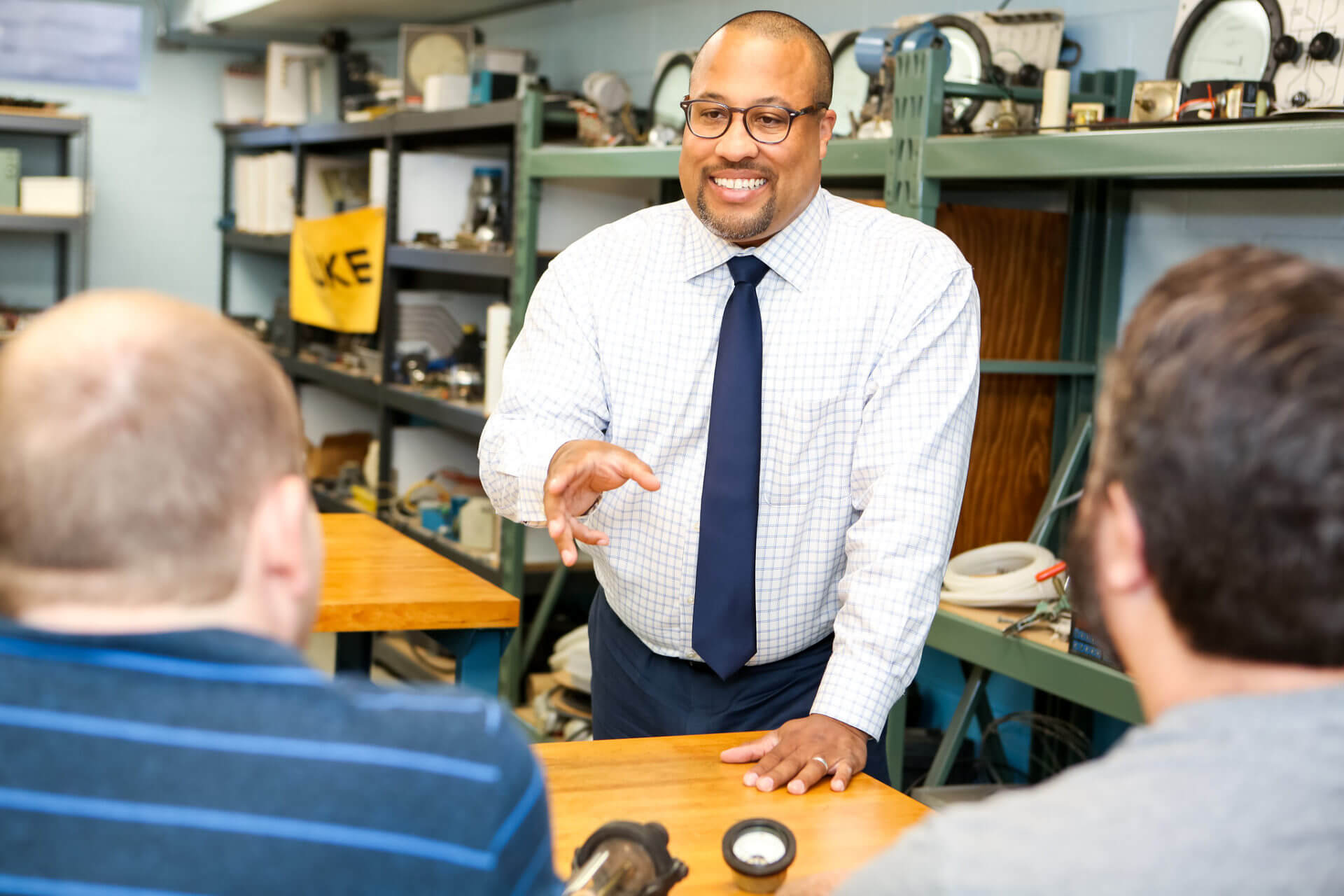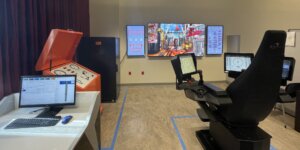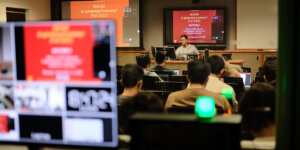
Uduak-Joe Ntuk, recently appointed as California’s 17th state oil and gas supervisor by Governor Newsom, talks about his job and experience at USC. (Photo/Courtesy of Uduak-Joe Ntuk)
In October 2019, alumnus Uduak-Joe Ntuk, M.S. PE ‘11, was appointed as California’s 17th state oil and gas supervisor, making him responsible for managing all oil fields, underground gas storage facilities and geothermal operations under the California Geologic Energy Management Division (CalGEM). Ntuk, an appointee of Governor Gavin Newsom, holds the highest statewide regulatory position in the upstream oil and gas sector. He is the first African-American to hold the position in California’s history.
In addition, he earned an undergraduate degree in chemical engineering from California State University, Long Beach, where he has taught in the chemical engineering department. “My goals for students in my classes were to help them get through the rigor of the technical content of the class, but also figuring out their technical career path,” he said.
Writer Sadia Hasan recently spoke with Ntuk about his work and his time at the USC Viterbi School of Engineering.
What motivated you to become California’s oil and gas supervisor?
I come from a family with a long tradition of public service. My grandfather was a flight deck captain in World War II in the U.S. Navy and both my parents were public school educators. I also worked for the city of Long Beach and city of Los Angeles before coming to the state. So, to me, it was a natural extension of my public service background.
I thought about my scope of impact of this job, which allows me to broaden my regulatory experience in underground natural gas and geothermal operations, and improve the environment in the most populous state in the union, thus making a positive change in the world. I thought it was an opportunity for me to do good for more people in a different capacity.
What impact does your job have?
Our state has arguably the strictest oilfield regulations in America. So, as far as safety, environmental protection, and spill prevention, I think we really have a national model of regulatory oversight. I believe California consistently sets a national standard. We have always been ahead of the curve in climate and energy policy, so many times what we do gets adopted nationally.
What is a newer project you and your office have been working on?
We’re working with the United States Environmental Protection Agency on our first two applications of carbon geologic storage wells in California history that we hope to drill in 2021. We are trying to address climate change, and California is moving to a new infrastructure on carbon capture using storage.
This new focus is called engineering carbon removal. It’s an opportunity for us to address our greenhouse gas emissions, but also to create new jobs; and [we] hope to be national leader in this new technology. The kind of carbon capture use and storage that we’re talking about has not been done in this way in California. It’s an opportunity for us to redefine addressing climate change. But also using our technical know-how and our geotechnical workforce to capture carbon dioxide directly out of the atmosphere and from industrial sources for permanent sequestration underground for at least 100 years. That can make a real impact.
Was USC Viterbi a good choice for you?
Yes, I came to USC for my master’s in petroleum engineering with an emphasis in smart oilfield technologies, which I graduated with in 2011.
I didn’t go straight from undergrad and go to grad school full-time for two years. Instead, I did it part-time while working full-time at Chevron in Bakersfield. I was in the DEN (USC Viterbi’s Distance Education Network) program here, which allowed me to work full-time at Chevron and still be a student at USC. It was very difficult to manage both, and I had to take additional classes due to my emphasis than a normal master’s degree. My degree was different because it focused on artificial intelligence and remote-control oil fields and was newer research back then.
Petroleum engineering is really about the subsurface oil and natural gas extraction processes, which was different from my undergrad in chemical engineering that focused on manufacturing and refining. This master’s program really let me combine those two disciplines into one.
How did your time at USC Viterbi prepare you for career success and help you achieve your goals?
I had classes on drilling and reservoir engineering to data management. But you see that there’s parallels from one area of science to another.
Currently, we’re looking at doing virtual inspections or remote witnessing through augmented reality due to the COVID-19 pandemic. I took classes on this about 10 to 12 years ago, and at the time, I thought we’ll never do this stuff. Now we are using drones, sensors and geospatial overlays of inspection, but also using our phones and apps to upload information onto our databases and look at videos later for proof of what happened, for example, to oil wells. What was cutting edge a decade ago is now more affordable and more widespread technology now. We learned how to make apps back then, which was breakthrough stuff. Now, everybody has apps.
Getting a master’s at USC helped create career opportunities for me I may not have otherwise had if I only had a bachelor’s degree. I may not have done an engineering master’s degree if it wasn’t for USC and the online structure of it. The blend of my undergraduate and master’s has helped me through my different careers paths in the private and public sectors. For example, I worked on both public policy and regulatory enforcement amongst a variety of projects when I was with the city of Los Angeles. I feel like the horse whisperer of oil and gas.
What are the highlights of your USC Viterbi experience?

Ntuk has been passionate about helping people, whether it was through teaching or now developing safe oil and natural gas conservation. (Photo/Courtesy of Uduak-Joe Ntuk)
I served on the advisory board for Center for Engineering Diversity (CED), so I would also be a guest speaker for student groups and get to interact with them. I was also a recruiter for Chevron. I would be there for the career fairs interviewing people, both undergrad and grad students, for internships and full-time jobs. So, I was able to stay connected, even though I was a remote student. Also, I would drive up to USC on the weekends and catch a football game, where I would get to sit in the student section and then head back to work on a Sunday.
I was also a part of the National Society of Black Engineers (NSBE) at USC where I was awarded the 2007 NSBE National Alumni of the Year for helping our student chapter for recruiting, guest speaking, and helping students go to the national convention.
What sort of legacy would you like to leave behind?
I’m an Eagle Scout, and one of the things that we were taught was to leave our campground better than we found it. And so, my goal is to leave this organization in a better place than I found it. We’re making a lot of progress on aquifer exemptions, protecting the environment and conservation projects. I’d like to see us make substantially more progress on those projects and move them forward. I’m going to do as much as I can while in this position to try and make a positive impact.
Published on January 20th, 2021
Last updated on May 14th, 2023












